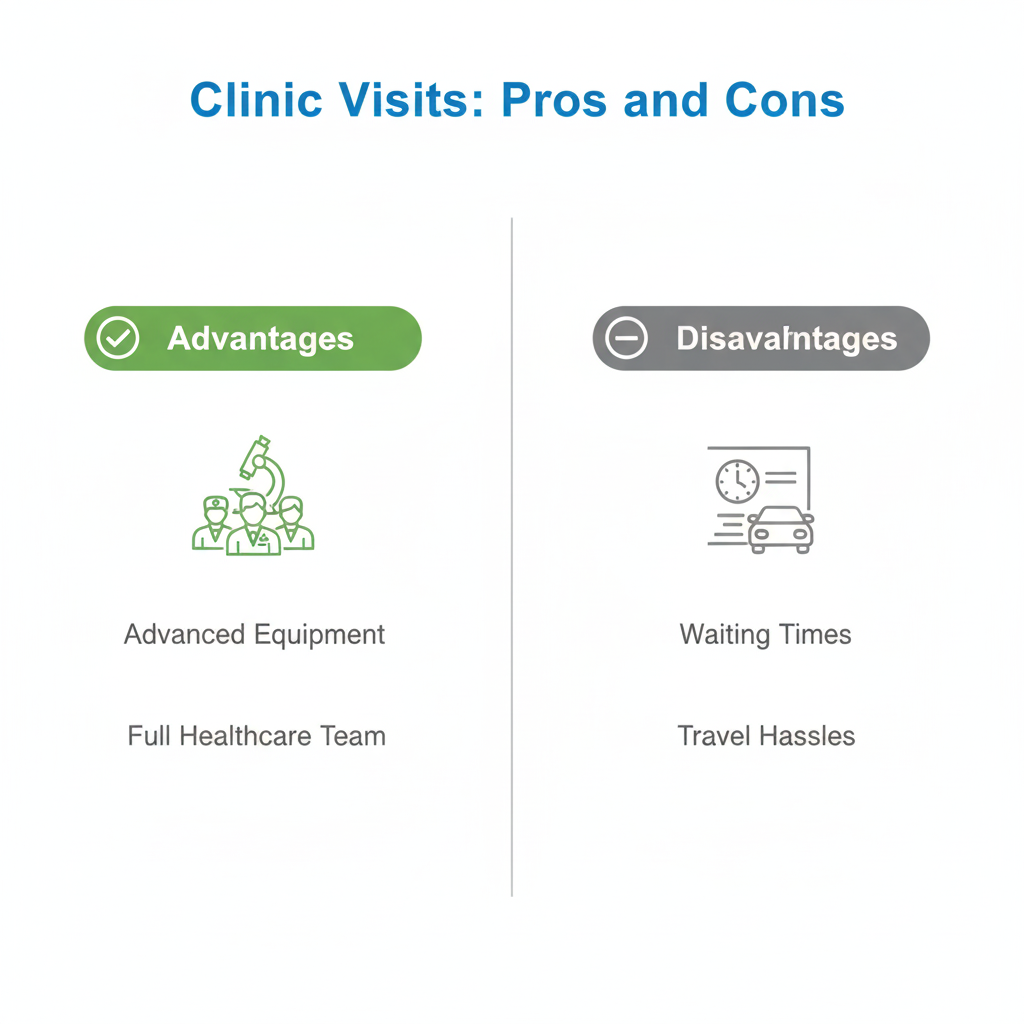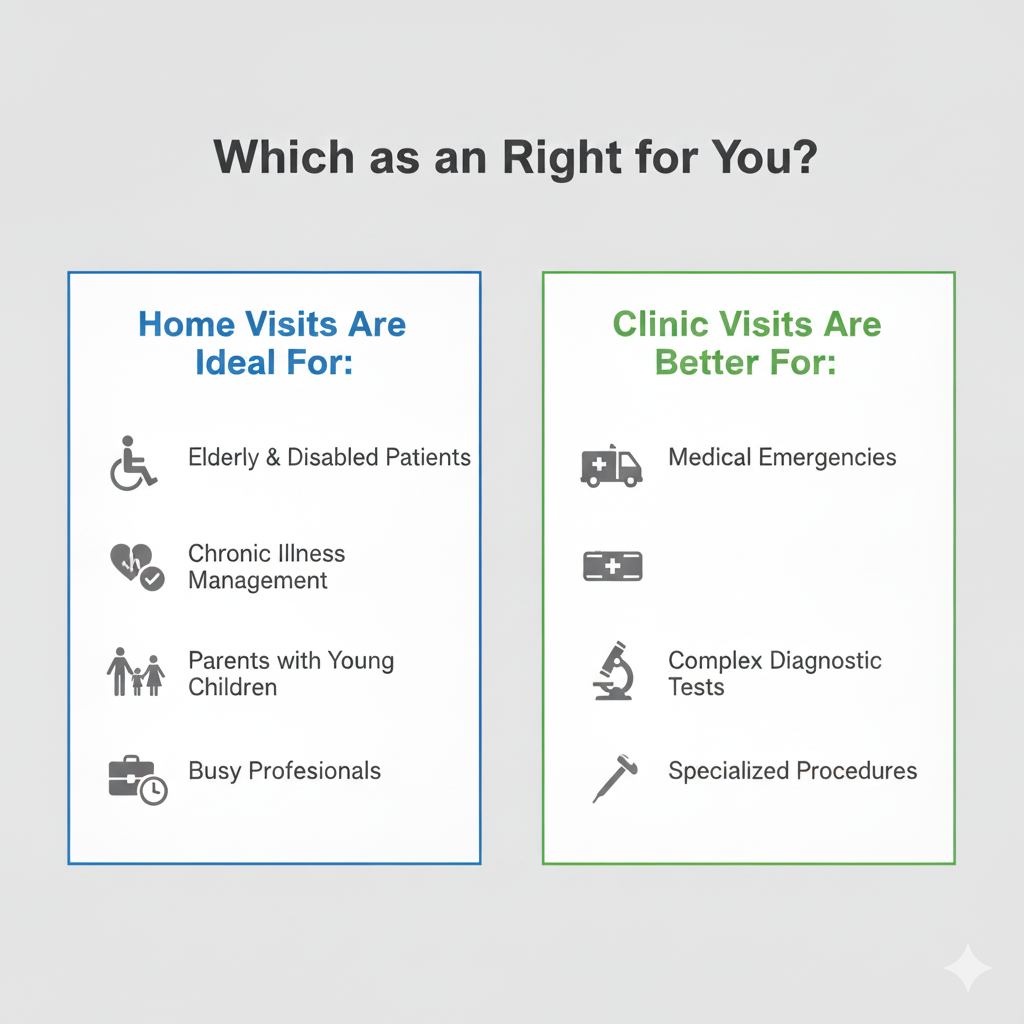Healthcare today gives patients many choices. Two main options are home doctor visits and regular clinic visits. Each has special benefits.Are you a busy worker? Do you care for an older family member? Maybe you have trouble getting around? Understanding these options helps you make smart health choices. This article looks at home doctor visits and clinic visits. We'll explore their benefits and things to think about.
What Are Home Doctor Visits?
Home doctor visits bring healthcare to your house. Doctors see patients where they feel most comfortable. These visits work well for regular check-ups and follow-up care. They help manage long-term health problems. They also support recovery after hospital stays.
Telemedicine and mobile medical apps make home care easier to get. Patients get personal attention plus convenience. This creates a better healthcare experience.
At DrMorepenHome.com, caring for patients comes first. They focus on making healthcare easy to access and comfortable. Dr. Morepen Home works to bring back the traditional doctor-patient relationship. They create a supportive space for patients in their own homes.
Overview of Traditional Clinic Visits
Clinic visits are the old way of getting medical care. When you visit a clinic, you can access many services. These include diagnostic tests and talks with specialists. Clinics have advanced medical tools and facilities. This allows for complete health checks and quick help when needed.
The clinic setting is more structured than home. But access to a full healthcare team gives many patients peace of mind. This structured space helps people who need multiple healthcare visits in one trip. Many different healthcare professionals are available.
Why Compare Home and Clinic Visits?
Comparing home doctor visits to clinic visits matters. Each model has clear advantages based on patient needs, health conditions, and lifestyle choices. More people want personalized healthcare today. Knowing the differences helps you make choices that fit your situation. This leads to better and more patient-friendly care.
Today's healthcare focuses on the patient first. Healthcare options must change to meet different patient expectations. Understanding these differences helps patients weigh their options. This shapes personalized care plans that best suit wellness goals.
%20(1).png)
Benefits of Home Doctor Visits
Patient Convenience and Comfort
Home doctor visits offer unmatched convenience. Patients with busy schedules benefit greatly. People with mobility problems do too. Those who simply prefer their own space find home visits eliminate travel needs. This reduces the hassle of clinic appointments.
The comfort of your own space helps your overall well-being. Familiar surroundings often reduce anxiety. This makes it easier for patients and healthcare providers to communicate openly. Better communication leads to more accurate assessments and effective treatment plans.
Personalized and Focused Care
During a home visit, the healthcare provider focuses only on you. There are no interruptions common in clinic settings. This creates a more intimate and thorough consultation. The physician can see your living conditions and lifestyle habits. They use these insights to create personalized care strategies.
The healthcare provider observes your living environment too. They can offer practical advice on health management. They can suggest safety improvements. This is crucial for patients with chronic conditions or those recovering from illness.
Reduced Risk of Infections
Home visits help patients avoid potential infections. Crowded clinic environments can spread germs. This is especially important for people with weak immune systems or underlying health conditions. The controlled home environment tends to be safer. It reduces the chances of getting infections from other patients or clinic visitors.
Ideal for Elderly and Disabled Patients
Home doctor visits help elderly and disabled patients greatly. These patients may have trouble traveling to clinics. Mobility is often a concern. Having medical care delivered to their doorstep ensures continuous care. It eliminates the physical stress of leaving home.
For caregivers, this means fewer logistics to worry about. It creates a more supportive healthcare experience for their loved ones. Doctors can observe the patient's home environment. This may help identify potential health issues related to living conditions. It directly impacts patient safety and care outcomes.
Cost Considerations
Home visits might seem costly at first. But they can lead to cost savings by preventing unnecessary hospitalizations. Regular monitoring and prompt medical attention reduce the need for emergency care. Eliminating travel costs and lost work hours adds economic value. This makes home doctor visits financially viable for many families.
Advantages and Disadvantages of Clinic Visits
Access to Advanced Medical Equipment
Clinics have the necessary tools and technology for advanced diagnostic tests and medical procedures. This immediate access to medical equipment ensures timely diagnosis and treatment. This advantage isn't always available during home visits.
Home visits offer personalized care. But clinics provide a more comprehensive technological framework. This supports accurate health assessments with diverse medical services.

Immediate Support from Healthcare Team
In a clinic, patients benefit from a full healthcare team's expertise. This includes nurses, specialists, and support staff. This multidisciplinary approach can enhance care quality. Different medical insights can be instantly added to a patient's treatment plan.
Patients requiring complex or multifaceted care may find clinics advantageous. Multiple healthcare professionals are readily available for consultations.
Suitable for Emergencies and Complex Diagnoses
For medical emergencies, clinic visits are the better choice. They offer the necessary infrastructure for urgent interventions. Comprehensive facilities enable clinics to handle complex diagnostic processes efficiently. This ensures prompt and effective care for critical conditions.
It's important to recognize when home care is adequate. You must also know when the clinic's resources are essential. This ensures safety and high-quality medical treatment for all patients.
Potential Downsides: Waiting Times and Travel Hassles
Clinic visits can pose challenges. Long waiting times are common. Travel inconveniences add stress. These factors can be taxing, particularly for patients with limited schedules. People needing frequent medical consultations face these problems too.
The impersonal nature of clinic environments may affect patient comfort and satisfaction. This makes home visits a valuable alternative. They offer a more relaxed and accommodating healthcare experience.
Home Visits vs. Clinic Visits: A Comparative Analysis
Who Can Benefit the Most from Home Doctor Visits?
Home doctor visits help several groups of people:
Elderly and Disabled Individuals: Those with mobility challenges benefit from home visits. They eliminate the stress and physical demands of traveling. Home settings allow caregivers to be present. This ensures that medical instructions are well understood and followed.

Chronic Illness Patients: People with chronic conditions often need regular monitoring. Home visits provide a convenient way to maintain this. They avoid frequent and potentially exhausting clinic visits.
Parents with Young Children: Traveling with children can be taxing, especially when they are sick. Home visits simplify healthcare for young families. Kids receive attention in a familiar environment.
Busy Professionals: People with demanding schedules find home visits offer flexibility and save time. They avoid time otherwise spent in transit and waiting rooms.
The personal approach and convenience of home visits explain why Dr. Morepen Home makes it their mission to tailor medical care. They work to meet the varying needs of patients. They ensure comprehensive service at home.
When Are Clinic Visits the Better Option?
Clinic visits may be preferred in several situations:
Acute Medical Emergencies: For immediate, life-threatening situations, clinics provide necessary facilities for urgent medical intervention.
Complex Diagnostics: Clinics house advanced diagnostic tools. They facilitate quick access to a range of tests and immediate specialist consultations. This is essential for thorough assessments.
Procedures Requiring Specialized Equipment: Some medical treatments need equipment not easily transported. This equipment is found readily in clinics.
These aspects underscore the importance of traditional clinics in providing essential healthcare services. They highlight the balance between home care convenience and clinic capability.
Debunking Common Myths About Doctor Home Visits
Several misconceptions surround home doctor visits that need clarification:
Myth: Home Visits Are Inconvenient for Doctors: In reality, healthcare providers like those linked with Dr. Morepen Home intentionally arrange home visits. They are structured efficiently to suit both parties.
Myth: Home Healthcare Is Less Comprehensive: With advances in portable medical technology, many tests and procedures can now be done in home settings. This ensures thorough care.
Myth: Home Visits Are Only for Terminally Ill Patients: While beneficial to palliative patients, home visits serve a diverse range. They offer routine care to anyone needing medical attention.
Clearing up these myths helps show the value and feasibility of home healthcare. It advocates for options like those from Dr. Morepen Home that offer thoughtful and patient-focused care solutions.
Making the Right Choice: Factors to Consider
Assessing Your Health Needs
When considering home or clinic visits, evaluating your specific health needs is crucial:
Current Health Status: Assess whether your condition requires frequent monitoring or specialized intervention.
Personal Preferences: Decide if the comfort of home is preferable. Or if the supportive infrastructure of a clinic suits your needs better.
Family and Lifestyle Dynamics: Consider the logistics for family members. This is especially important if you're a caregiver or parent.
Reflecting on these areas can lead to informed decisions about the most appropriate healthcare setting.
Considering Availability and Accessibility
Accessibility and practical logistics heavily influence the choice between home and clinic visits:
Geographical Location: Consider whether home visits are feasible. This depends on the proximity of healthcare providers.
Insurance Coverage: Check whether your health insurance covers home visits. Find out the extent of coverage for each type of visit.
Local Healthcare Options: Availability of quality clinic services or home healthcare options in your area may guide your decision.
Ensuring availability can directly affect the feasibility of consistent and effective medical treatment.
Understanding the Role of Technology in Both Models
Technology plays an increasingly significant role in bridging the gap between home and clinic healthcare:
Telemedicine: Enables video consultations. This expands accessibility to healthcare while reducing the necessity of physical visits.
Mobile Medical Devices: Home visits now include tools for performing diagnostics once exclusively available in clinics.
Electronic Health Records (EHRs): Facilitate seamless information sharing between home-based and clinic-based care providers.
Embracing technological advances allows for enhanced care continuity and patient engagement. This makes healthcare efficient and patient-friendly.
The Future of Home Healthcare: Trends and Innovations
Telemedicine and Virtual Consultations
Telemedicine is changing the healthcare landscape. It provides remote consultations, particularly impactful in home-based care. This integration allows:
Real-Time Access: Patients receive medical advice without travel.
Flexible Scheduling: Illnesses and consultations don't disrupt daily lives.
Continual Monitoring: Chronic conditions are managed with regular virtual check-ins.
Dr. Morepen Home, like other progressive healthcare providers, uses telemedicine to enhance their services. This ensures patients receive quality care wherever they are.
.png)
Innovations in In-Home Medical Care
Recent innovations have broadened the scope of in-home medical care. They empower providers to deliver treatments effectively:
Portable Diagnostic Tools: Enable comprehensive evaluations and effective diagnosis in home settings.
Medication Management Systems: Assist patients in following prescribed regimens with reminders and digital tracking.
Home Health Monitoring Devices: Vital signs and ongoing conditions are tracked continuously without clinic visits.
These advances highlight the evolving nature of healthcare delivery. They demonstrate a commitment to maintaining patients' quality of life at home.
The Growing Popularity of Home Physician Services
The increasing demand for home healthcare services reflects broader trends in patient care priorities:
Personalization: Emphasizing tailored approaches, patients favor services reflecting individual needs.
Holistic Care: Home environments naturally enable consideration of factors like lifestyle that influence health.
Cost Efficiency: Preventive and proactive care reduces unnecessary expenses.
Dr. Morepen Home aligns with this trajectory. They offer adaptable services meeting diverse requirements as healthcare continues to advance into personal spaces.
Conclusion
Navigating the choice between home doctor visits and traditional clinic visits requires thoughtful consideration. You must think about personal needs, lifestyle, and health priorities. Home doctor visits present an attractive option for those seeking convenience, personalized care, and decreased risk of infections. They are especially valuable for elderly or mobility-challenged patients. With DrMorepenHome.com, patients can experience compassionate in-home medical care. This aligns with their individual preferences and health goals.
On the other hand, clinic visits provide access to advanced medical equipment and a team of healthcare professionals. This is essential for handling emergencies or complex health issues. The clinic setting ensures comprehensive care. It benefits those needing immediate diagnostic support or specialized interventions.
In choosing the right care option, patients should evaluate their specific requirements. Consider the potential drawbacks. Balance these factors against the benefits. Understanding the role of technology and innovations in home healthcare is also vital in making an informed decision.
As healthcare continues to evolve, exploring available options can ensure you receive the best possible care. Whether you choose the convenience of home visits or the structured care of a clinic, your decision should reinforce your health and well-being. DrMorepenHome.com remains dedicated to delivering tailored, patient-focused care that meets diverse medical needs and expectations.
FAQ
Are home doctor visits more expensive?
The cost of home doctor visits can vary based on factors such as the type of care provided and the location. While some patients think home visits cost more than clinic appointments, they often find value in the personalized service. This reduces the need for frequent hospital admissions. Additionally, avoiding travel expenses and potentially unpaid leave from work can offset the initial cost. This makes home visits a viable economic option.
How do home visits work with insurance?
Home doctor visits are increasingly recognized by many insurance companies. Coverage can depend on the specific policy and insurer. It's advisable for patients to consult with their insurance provider to determine coverage for in-home medical care. Understand any potential out-of-pocket costs. Many providers like DrMorepenHome.com offer services that may align with common insurance requirements. This facilitates smoother integration into existing health plans.
What services are typically offered during a home visit?
Home visits can include a broad range of services. These include routine check-ups, chronic disease management, post-surgical care, and acute illness assessments. Healthcare providers may also conduct diagnostic tests, administer medications, and offer lifestyle and preventive health advice during these visits. By tailoring the service to meet individual patient needs, providers create a holistic care experience. This extends beyond immediate medical treatment.
Who benefits most from home doctor visits?
Patients with limited mobility benefit most from home doctor visits. Those with chronic health conditions, elderly individuals, and caregivers seeking convenience typically benefit too. These visits offer a patient-centered approach that considers the entirety of a person's health situation. They provide comfort and reduce the stress associated with traveling to healthcare facilities. By making access easier, home visits empower these individuals to maintain regular and effective medical care.
Can home doctor visits handle emergency situations?
While home doctor visits are best suited for non-emergency care, they are not ideal for emergency situations needing immediate medical intervention. Home visits work well for routine check-ups and ongoing management of chronic conditions. Patients experiencing medical emergencies, such as severe chest pain or difficulty breathing, should seek immediate care at a clinic or hospital. These facilities are equipped to handle urgent medical needs.
.png)



.png)
.png)
.png)
.png)
.png)
.png)
.png)

.png)
.png)
.png)

.png)
.png)
.png)
.png)
.png)
.png)

.png)
.png)

.png)
.png)
.png)

.png)

.png)


.png)







